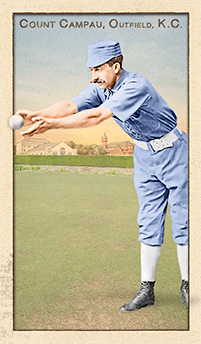
- Series: Beginnings: 1880's
- City: Kansas City
- Team: Blues (WA)
- League: Western Association
Charles Columbus Campau (1863-1938) may have been dubbed “The Count,” but he was the King of the Minors in the 19th century. No one matched his offensive output and he was prized especially for his defense. The scion of the French-Canadian founders of his native Detroit, Campau reigned in the society of the city and its ball fields. Educated at Notre Dame, he began playing there at an early age and soon came to dominate with his power and speed. He left Detroit with mentor Al Buckenberger to begin his pro career with Erie of the Interstate League in 1884. Thus began a two-decade tenure, mostly in the minors, that would take the Count to twenty different clubs including brief stints in the majors. His debut was back home with the Wolverines filling in for an injured Sam Thompson in ‘88. He stayed on with the newly constituted International League version of the Wolverines the following season and would have but one more turn in the big leagues, with the Browns in 1890 (save for two games with the Senators in ‘94). This would allow the hard-hitting Campau to claim a rare (unique?) distinction of leading the (minor league) International League and (major league) American Association in home runs in the same season. Charlie was known for his leadership skills and often served as on-field manager. Browns' owner Chris von der Ahe used him so in St. Louis that year and would call him “the best captain I have ever had.” Campau’s batting average could fluctuate, but his speed steadily improved to the point he was running foot races for prizes and was reputed to have never lost a match. The sketchy data of minor league stolen bases leaves a lot unknown but his feats were legendary. He swiped 100 bases in ‘87 and was renowned for a “home run” he hit by rounding the bases on a muffed pop-up in front of the plate.
- Campau continued in the minors through the 1905 season and umpired the following year. Never losing his love for speed, Charlie retired and went into the horse racing business and worked around the nation’s tracks in various capacities the rest of his life
- von der Ahe had sacked his prized manager for faithfully enforcing the owner’s own rules. The Count got a bit of revenge the next day, hitting an inside-the-park grand slam to the delight of St. Louis fans who rained down a deluge of cigars. Enough, Campau said, to open his own store
- Campau enjoys five known poses in the Old Judge canon
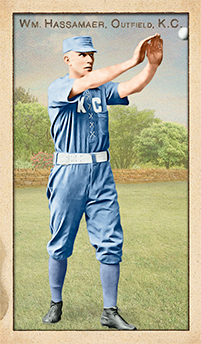
- Series: Beginnings: 1880's
- City: Kansas City
- Team: Blues (WA)
- League: Western Association
William Louis Hassamaer (1864-1910) played outfield for three seasons in the National League. His rookie campaign was with the Senators in 1894, the team he would start the ‘95 season with before being sent to Louisville, where he would finish his ML career a year later. Bill made a splash in his first year in the big leagues. On June 13, 1894 he became the 30th ML player to hit for the cycle, in a game against the St. Louis Brown Stockings. The feat had actually been accomplished 36 times previously. Curry Foley recorded the first cycle in 1882 (some sources cite a 1st cycle by George Hall in 1876); Long John Reilly recorded three cycles with the Reds between their stints in both the AA & NL (his first two cycles were only seven days apart); and Dave Orr, Tip O'Neil, Pete Browning & Mike Tiernan had each recorded two cycles by the time Hassamaer earned his membership to the elite club.
Hassamaer’s debut was auspicious in every sense that rookie year. He hit .322 with four homers and 90 RBI. He showed some speed as well, stealing 16 bases. Unfortunately, Hassamaer’s performance would steadily decline thereafter. He never again attained any of the offensive output of that first season. His second year with Washington saw his average drop to .278 with a tail-off in every category. He was purchased by Louisville for $200 on August 23, 1895. The move to Kentucky only sent Bill’s record into a deeper spiral. He batted a mere .208 for the 23 games he played at the end of the ‘95 season. Despite this meager accomplishment, the Colonels gave Hassamaer another shot in ‘96, but his .245 average with little power proved too little and he was released after only 30 games.
Prior to joining the National League, Bill had a successful tenure in the minors. He had begun in 1887 with the Western League’s Kansas City Cowboys, playing full time and hitting .371. After a second year in KC, he bounced around a number of teams and his average fluctuated wildly. His efforts for the Montgomery Colts of the Southern Association in 1893 paved the way for his major league call-up when he hit .321.
- Hassamaer’s swan song came with the Bridgeport Orators of the Connecticut League in 1899 where he played for the club’s namesake and manager, Jim “The Orator” O’Rourke. O’Rourke had enjoyed one of the finest playing careers in the early game and was inducted into the Hall of Fame in 1945
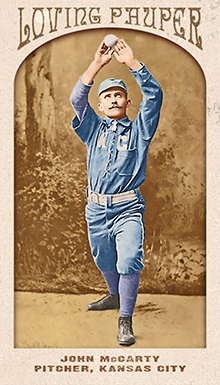
- Series: 1880s: Loving Paupers
- City: Kansas City
- Team: Blues (WA)
- League: Western Association
John A. McCarty (1867-1942) pitched in professional baseball for five years with one season in the majors. McCarty began at age 20 with the Emporia Reds of the Western League, starting eight games (tied for the most on the team that brief stint) and losing six despite a team-leading 2.92 ERA. He moved to the WL’s Kansas City Cowboys later in the year and went 3-2 on a large roster led by Kid Nichols who starred in his first professional season with an 18-12 record. The following year KC joined the Western Association as the Blues. They clearly liked what they had seen in ‘87 and retained McCarty for the ‘88 campaign. The young hurler rewarded the franchise with an excellent year, winning 21 games against 11 losses with a 2.42 ERA. Despite the 21 wins, Kid Nichols outshone McCarty again, winning 16 of his 18 games pitched with a remarkable 1.14 ERA. True to its decade, with leagues evolving and franchises morphing, 1889 found McCarty with a major league team without changing his address. He now pitched for the Kansas City Cowboys of the American Association. Unfortunately for John and his team, genuine big league competition exposed good minor league players. Nichols was in Omaha pitching to a 39-8 record, the Cowboys sank to seventh in the league and McCarty saw limited duty in just 15 games, winning eight and losing six with a 3.91 ERA in his lone major league campaign. He was demoted to the WA’s St. Joseph Clay Eaters for the remainder of ‘89 where he did start 15 games, but won only five. He had one more try with the Detroit Wolverines in their International Association incarnation in 1890, achieving a 9-9 record in a truncated season.
- BaseballReference.com records McCarty was on the roster for the 1891 KC Blues of the WA, but he appeared in only one game, giving up twelve hits and eight runs (two earned) in six innings and earning a no decision
Auction History
Cartophilia
Old Judge Pose: 302-3
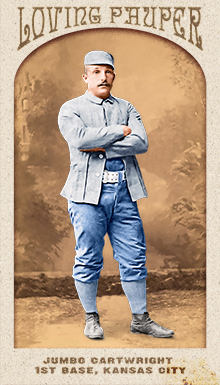
- Series: 1880s: Loving Paupers
- City: Kansas City
- Team: Blues (WA)
- League: Western Association
Edward Charles Cartwright (1859-1933) was built to anchor first base and, once he finally made it to the majors at age 30, he did just that; first for the Browns in 1890 and then for four straight seasons with the Washington Senators of the National League from '94-97. The stocky 5'10” 220 lb infielder hit well until his final season, better than he had in the minors. His rookie year saw him hit .300 while driving in 60 runs. After a three-year hiatus, he continued his excellent offense, highlighted by a .331 average in 1895. He carried his weight well, evidenced by the fact he still ranks 13th all-time among base stealers who played for D.C. teams. Jumbo began with Youngstown in 1883 and had one season -1886- with the Acid Iron Earths in Mobile for the Gulf League, one of the more intriguingly-named clubs in the universe of minor league baseball that had some doozies. He was with New Orleans in '87 then Kansas City and St. Joseph (another of those tantalizingly-dubbed clubs-the Clay Eaters) before heading north to Montreal in the International Association to begin the 1890 campaign prior to his call to St. Louis for his MLB debut. Despite hitting .300 in 75 games for the Browns, Ed was sent west where he played for San Francisco, Tacoma and Missoula before returning closer to home with Memphis for the '93 season. He was released by the Senators in mid-1897 and played a few more games with the Minneapolis Millers as his pro career came to an end.
- Jumbo had a game whose output at the plate justified his nickname. On September 23, 1890 he drove in seven runs in one inning, setting a mark that would stand for 109 years until another St. Louis warrior, Cardinal Fernando Tatís, hit two grand slams off the Dodgers' Chan Ho Park in the third inning on April 23, 1999
Auction History
Cartophilia
Old Judge Pose: 70-1
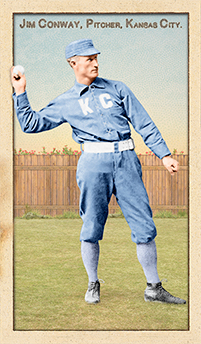
- Series: Beginnings: 1880's
- City: Kansas City
- Team: Blues (WA)
- League: Western Association
James P. Conway (1858-1912) pitched briefly in 1884 and ‘85 for the Brooklyn Atlantics and Philadelphia Athletics of the American Association. He was 3-9 for the Brooklyn and 0-1 for the A’s before returning to the minors, primarily in the Western and Southern leagues. Jim came back up with the Kansas City Blues in 1889 and had a fine season, winning 19 as the ace of a struggling team that finished 7th in the AA. The year before, Jim’s kid brother Pete had won 30 games for the Detroit Wolverines but quickly faded from the game along with Jim who’s arm gave out after that one stellar year. Jim managed to return to the mound after a year’s layoff but went only 8-12 for two minor league clubs in 1891-92.
- It has been speculated that Conway’s demise as a major-league pitcher had more to do with attitude than physical limitations. He was nicknamed “Dark Days” to signify a sour disposition
- Jim was a teammate of Hall-of-Famer Billy Hamilton who stole 111 bases in 1889




